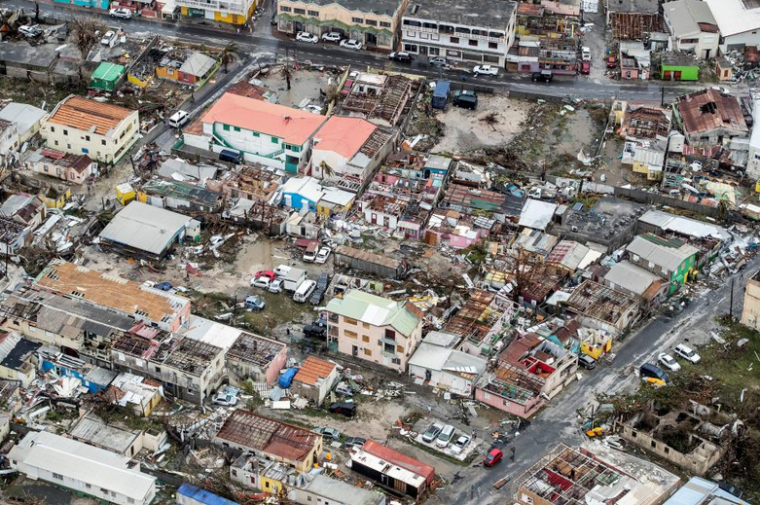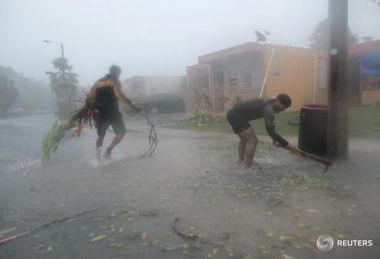Hurricane Irma brings 'carnage' to the Caribbean, killing 8 as Christian Aid assists on the ground

Hurricane Irma, one of the most powerful Atlantic storms in a century, today killed eight people on the Caribbean island of Saint Martin and left Barbuda devastated before heading towards Florida.
Power was knocked out in Saint Martin, Saint Barthelemy and in parts of the US territory of Puerto Rico, as television footage of the Franco-Dutch island of Saint Martin showed a damaged marina with boats tossed into piles, submerged streets and flooded homes.
'It is an enormous disaster, 95 percent of the island is destroyed. I am in shock,' Daniel Gibbs, chairman of a local council on Saint Martin, told Radio Caribbean International.
The French Interior Minister Gerard Collomb said eight people were killed and the toll was likely to rise.
'We did not have the time yet to explore all the shores,' Collomb told Franceinfo radio, adding that 23 people were also injured. In all, at least 10 people were reported killed by Irma on four islands.
Irma caused 'enormous damage' to the Dutch side of Saint Martin, called Sint Maarten, the Dutch Royal Navy said. The navy tweeted images gathered by helicopter of damaged houses, hotels and boats. The airport was unreachable, it said.
The hurricane was on track to reach Florida on Saturday or Sunday, becoming the second major hurricane to hit the US mainland in as many weeks after the deadly Hurricane Harvey.
The eye of Irma was moving west-northwest off the northern coast of the Dominican Republic, the National Hurricane Center (NHC) said.
The NHC said it was the strongest hurricane ever recorded in the Atlantic Ocean and one of the five most forceful storms to hit the Atlantic basin in 82 years.
The island of Barbuda is a scene of 'total carnage' and the tiny two-island nation will seek international assistance, said Gaston Browne, prime minister of Antigua and Barbuda.
Browne told the BBC that about half of Barbuda's population of some 1,800 were homeless while nine out of 10 buildings had suffered some damage and many were destroyed.
'We flew into Barbuda only to see total carnage. It was easily one of the most emotionally painful experiences that I have had,' Browne said in an interview on BBC Radio Four.

'Approximately 50 percent of them (residents of Barbuda) are literally homeless at this time. They are bunking together, we are trying to get ... relief supplies to them first thing tomorrow morning,' he said, adding that it would take months or years to restore some level of normalcy to the island.
Browne said one person was killed on Barbuda. A second storm-related fatality, that of a surfer, was reported on Barbados.
Irma's precise course remained uncertain but it was likely to be downgraded to a Category 4 storm by the time it makes landfall in Florida, the NHC said.
The carnage came as Christian Aid was working with local partners on evacuation plans and stockpiling provisions on the ground.
Prospéry Raymond, country manager for Christian Aid in Haiti and Dominican Republic said: 'Hurricane Irma is huge and we are very worried about the people in Northern Haiti and the Dominican Republic; particularly vulnerable communities. Our partners are doing all they can to evacuate as many people as possible and find them safe shelter.
'For example, in the North East of Haiti, we have built more than 160 hurricane-resistant houses, and some of those families will host others if needed. But we fear that Irma will wipe out even well-built houses.
'People are being moved to schools and churches for safety but in some areas, especially in the North West of Haiti, these buildings will not withstand the force of the storm. In these cases, they need to be transported to safer locations in the cities.
'We work with some of the poorest communities in these countries and they are still reeling from Hurricane Matthew last year which was also a category five. There is no time for them to recover between these disasters and now we are already hearing about Hurricane José which is only about four days behind Irma.'
As well as evacuating people, Christian Aid partners including MISSEH, KORAL and Haiti Survie are clearing the ravines and canals of rubble so that the expected influx of rainfall can flow more easily and not cause even more damage by blocked waterways pushing the water through communities.
Climate change campaigners believe Irma is so powerful because there has been a rise in temperature in the Atlantic Ocean. Hurricanes benefit from warmer water.
Richard Ewbank, climate advisor at Christian Aid, highlighted the links between climate change and the severity of the hurricane. 'Cyclones churn up the sea surface layers below them, mixing cooler, deeper water with warmer surface layers,' he said. 'This usually limits the ability of the storm to persist and gather moisture. But in Irma's case, and in Harvey's last week, the deeper layers are also warm creating a longer and more dangerous storm. Irma has had longer over open water to build up to category five (Harvey only made four) and develop a larger storm surge.'
Additional reporting by Reuters.











